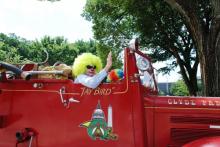uncertainty

One of the most familiar biblical passages to be read during Advent is from Isaiah 9:6: “For to us a child is born, to us a son is given, and the government will be on his shoulders. And he will be called Wonderful Counselor, Mighty God, Everlasting Father, Prince of Peace.”
At the time it was spoken, the whole world was falling apart, or so it seemed to the eighth-century prophet Isaiah. Looking over history at a string of failed rulers, and staring into the abyss at ongoing chaos and political disaster, Isaiah looked forward to a time when God would send an heir to the throne who would be a different kind of ruler, a divinely appointed one (the Messiah), and his name would tell his character. Isaiah promised a people whose hope was failing that a baby would be born.
But where do babies come from? They come from women, women who endure the discomforts of pregnancy and the excruciating pain of labor to bring forth life.

The day after Easter, it snowed. I was carrying in my last buckets of sap before leaving for Portland and was not surprised by the flurries, but they still stymied my expectations of warmer weather. The equinox had passed several weeks before, and while the start of spring had been marked on the calendar, it was (is) dragging its feet in coming.
Who has known the mind of God or even a good 7-day weather forecast?
We see and know in part. Certainty has never been the steady state of the human condition. Our lives are stretched with the awareness that clarity, at its best, comes with a smudge.
The experience of knowing we do not know can be felt in different ways. One is confusion, another, mystery. Both are confrontations of the hidden or unknown, but one brings us to awe and the other despair. One can leave us feeling isolated and the other in wonder at our relationship to that which is so much greater than ourselves.
The space between the two is not in the level of knowledge but rather our relationship to the knowing and unknowing itself. In the midst of our unknowing, we are faced with a choice: passive uncertainty or the stumbling action of faith. The beginning of wisdom is not the expectation of certainty with knowledge but the understanding that the kind of life most worth living is always an act of faith.

Many people fear death. It’s an understandable fear. And one that’s socially acceptable.
But shouldn’t we also admit that living can be scary as hell, too?
As any fan of The Walking Dead and other apocalyptic fiction knows, it doesn’t take much for the lines between order and chaos, between civility and mayhem, and between trustworthiness and falsehood to be exposed as thinner than advertised.
We aren’t given a choice. We navigate a world in which we exercise little real control.
Co-pilots aren’t supposed to crash commercial jets.
States can't just grant individuals and businesses the right to discriminate against under-protected groups under some squishy definition of "religious freedom," can they?
We may never learn where those two-hundred-plus Nigerian girls were taken, the ones kidnapped from their school — their school! — nearly one year ago.
Why does NIMBYism derail so many good-faith and promising efforts to help rehabilitate released felons and other at-risk populations?
What part of the world that I can barely locate on a map has my country decided to bomb for me today?
Confidence and fear travel through our veins, compelling us, as they act out their odd, entangled relationship. We rarely have the luxury to see where our choices will lead us. We’re swept along by others’ choices and barely detectable forces.
Anxiety is more than a devious marketing strategy in cable news channels’ portfolios; it arises from life’s uncertainties. It’s a way our bodies ask whether we can trust those yearnings that give birth to our hopes for a society that truly flourishes.
Who doesn’t live by some kind of faith? Such “faith” can be a reliance on effort and intelligence, a willingness to surrender to risk, a retreat into the security of privilege, a decision to live for others, or a resigned acceptance that at least we’ll have company when disaster strikes. What, finally, compels us forward?

Have you ever been enamored by a child’s sense of wonder? Their incredulous awe in myths like the tooth fairy and Santa, their wide-eyed anticipation of unwrapping a present?
We are most inspired by the unknown.
A magic trick — how did they do it?!
A movie with surprising plot twists.
A news scandal shrouded with mystery.
We are drawn to the unknown because it tickles the innate sense of curiosity within us to discover and explore. Mystery invites participation, not for the sake of removing what is unknown, but to ignite a passion for learning beyond what is certain and be changed through the process.
Why is it then, we insist on equating our Christian faith to certainty? We sing about a Blessed Assurance and hold intensive meetings to discuss the essentials of faith. We share testimonies of God stories to shelve any doubts of God’s existence. We preach the same sermons, pray the same prayers, tell the same stories, week after week to convince ourselves it all is still true.
Is this what our Christianity has been reduced to, more of the same? I am sorry, but I simply cannot muster up anymore enthusiasm for such a formulaic faith; it’s like taking elementary classes all over again. I already know that two plus two equals four.
I am longing for the gift of uncertainty, a type of profound mystery that welcomes questions, a faith that requires a leap of faith to sustain.

Uncertainty about the existence of God is not the same thing as certainty about the non-existence of God.
I’ve enjoyed taking part in the “Subverting the Norm” conference this weekend with many of the forefront thinkers in what has been called “Radical Theology.” Although the word “radical” has sensationalist connotations for lots of people, it really just means a theology that isn’t firmly rooted. I know that in itself sounds scary to some folks, but the radical theology camp might suggest that fear stems from an addiction to certainty.
JUST A FEW dozen pages into Faith, Doubt, and Other Lines I've Crossed, evangelical pastor Jay Bakker pens what may be the best explanation for the Christian emphasis on church community that I've ever encountered. Noting that doubt can be "hard and scary," Bakker writes: "That's why we have one another, why we have community. We can go through those days of doubt together. I wouldn't be who I am today if it weren't for the people who have been there with me as I question everything."
Many writers have grappled with the challenge that doubt poses for religious believers. But in this honest, searching, and ultimately uplifting book, Bakker pulls doubt out of the shadows where many believers wrestle with it on their own and instead presents it as a reality that Christian communities can and should address together.
Bakker's approach to the often-taboo topic of questioning—or, as he puts it, "the sense that faith is crap, life is meaningless, there is no God, the Bible is a fraud, Jesus was just a charismatic man turned mythological figure if he existed at all"—is shaped by his childhood in a Pentecostal environment that left no room for doubt. As Bakker ruefully notes in the book's introduction, "I will probably be 80 years old and still introduced as Jay Bakker, son of Jim and Tammy Faye." That unusual background only provides the impetus, however, and not the substance for this book, which reads mostly as the stream-of-consciousness meditation of a man pushing and pulling at his faith to see if it holds up.

We’ve invested eight years of our lives into this community called Milagro Christian Church (Spanish for “Miracle”). As we have said many times before, it has our DNA throughout it. Our story is Milagro’s story. Our struggles and breakthroughs have been Milagro’s struggles and breakthroughs.
And now the paths are diverging, and although it’s exciting and necessary, there’s a part of it that really sucks.